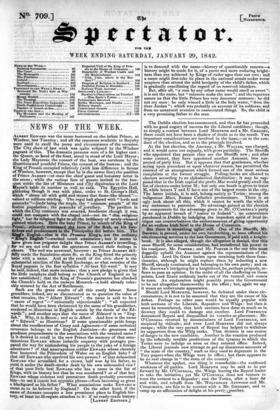The Dublin election has commenced, and thus far has proceeded
with no good augury of success for the Liberal candidate ; though, as simply a contest between Lord MORPETH and a Mr. GREGORY, there could not have been a shadow of doubt as to the result. Two important considerations are involved in the issue,—as to the con- duct of the election, and as to the principle involved. At the last election, the Assessor, a Mr. WALLER, was charged, and it would seem not unjwitly, with gross partiality. The Sheriff's who appointed that person then are the Sheriffs now ; and after some contest, they have appointed another Assessor, less sus-, peeled of party bias. But it appears that that gentleman, whether acting Upon precedent or upon whatever reason, has permitted the renewal of an arrangement which formed one of the most serious complaints at the former struggle. Polling-books are allotted to electors according to an alphabetical distribution: it may be sup- posed that in the Irish capital the prefix Mac would greatly swell the list of electors under letter M; but only one booth is given to letter M, while letters T and II have one of the largest rooms in the city. The latter initials' it is said, belong mainly to Tories : among the indigenous Macs, Roman Catholics predominate. There is an ugly look about all this, which it cannot be worth the while of any statesman to patronize. No advantage gained at the election can compensate for the advantage given to Mr. O'CorinELL's party by an apparent breach of "justice to Ireland" ; no convenience purchased in Dublin by indulging the impudent spirit of local in- trigue can counterbalance the embarrassment of giving opportunity for an endless Irish howl in the House of Commons.
But there is something uglier still. One of the Sheriffs, Mr. BROWNE, is proved, under his own handwriting, to have offered his electioneering services to the late Goverment, if paid with a knight- hood. It is also alleged, though the allegation is denied, that this same Sheriff, for some consideration had transferred his power to his coadjutor, Mr. PORTER; and Mr. PORTER is the one who most doggedly upheld the Assessor against the representations of the Liberals. Lord DE GREY insists upon retaining both these func- tionaries although he might replace them by inducting a new Sheriff; already cominated, and belonging to his own party ; and on Mr. BROWNE'S intriguing for a knighthood, he, perhaps properly, re- fuses to pass an opinion. In the midst of all the chaffering on these , points, Lord ELIOT suddenly backs out of the turmoil and comes to town. An explanation might possibly prove the Government to be not altogether blameworthy in the affair ; but, again we say it wears an unfortunate appearance. Should Lord MORPETH, however, be defeated under these cir- cumstances, it is not to be assumed that they are the cause of his defeat. Perhaps no other man would be equally popular with. both sections of the Liberals, Repealers and Whigs : but then it must be remembered, that both sections have done as much as in decency they could to damage one, another. Lord Foarssenx denounced Repeal and disqualified its votaries as placemen : Mr. O'CONNELL retorted by denunciations of Lord YORTESCIIE, not unspiced by ridicule ; and even Lord MORPETH did not always escape; while the very pursuit of Repeal has helped to withdraw its supporters from the Whig ranks. That division is one source of danger to the new candidate. Another is the reaction produced by the inflatedly terrible predictions of the tyranny in which the Tories were to indulge as soon as they entered office. Indeed, the Liberal journals now attempt to get up disastrous accounts of "the state of the country," such as they used to deprecate in the Tory papers when the Whigs were in office; but there appears to be no real change in "the state of the country." Whatever the upshot, one thing is remarkable—the confessed weakness of all parties. Lord MORPETH may be said to be put forward by Mr. O'CONNELL, the Whigs leaving the Repeal leader to take the initiative ; yet Mr. O'CowNELL does not venture to trust the contest to a Repealer : and the Tories, after a hunt far and wide, and rebuffs from Mr. WOLYERLEY ArrwooD and Mr. COLQIIHOUN, are fain to be content with a Mr. GREGDRY, and to vamp up an affectation of delight at his prettwreches.


























